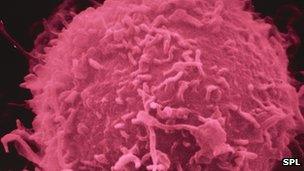University of Dundee uncovers new way to treat leukaemia
- Published

The drug was found to kill cancer cells in Leukaemia patients without affecting the level of the protein p53
Researchers at the University of Dundee have found a new way to kill cancer cells in people with one of the most common forms of leukaemia.
The team looked at chronic lymphocytic leukaemia (CLL) and its reaction to treatment with the drug Tenovin.
Tenovin was found to kill the cancer in Leukaemia patients without affecting the level of a tumour-suppressing protein.
It is thought it could lead to improved treatments in future.
Normally, Tenovin affects cancer cells by increasing levels of the "guardian angel" protein p53 within cells, which plays a crucial role in controlling cell mutations.
However, the team found that when treated with the drug, the CLL cells died but without showing a change in p53 levels.
The scientists then discovered that in leukaemic cells, Tenovin is able to interfere with the process of "self-digestion" that leukaemic cells use to protect themselves during periods of stress.
Protection disrupted
The study was led by Dr Sudhir Tauro from the Dundee Cancer Centre at Dundee University.
He said: "This process, called autophagy, is important to the survival of all cells.
"It is noteworthy that while it has the important effect of disrupting this process in CLL cells, Tenovin did not affect normal blood-forming cells.
"Based on these findings, we can now exploit that difference and begin to develop safer anti-leukaemic drugs for CLL."
Current anti-leukaemia drugs often cause toxicity-related problems, particularly in older patients where treatment can affect a normal blood count.
They also tend to become less effective when used repeatedly.
The study has been funded by the charity Tenovus, which also supported the original development of Tenovin.
Prof Peter Howie, from Tenovus Scotland, said: "The aim of Tenovus Scotland-Tayside is to support medical research in Tayside which will ultimately lead to the benefit of patients.
"Tenovus in Tayside is delighted to see that its investment in the development of Tenovin is being taken forward by Dr Sudhir Tauro's exciting work in leukaemia."
- Published26 February 2013
- Published19 February 2013
- Published13 February 2013